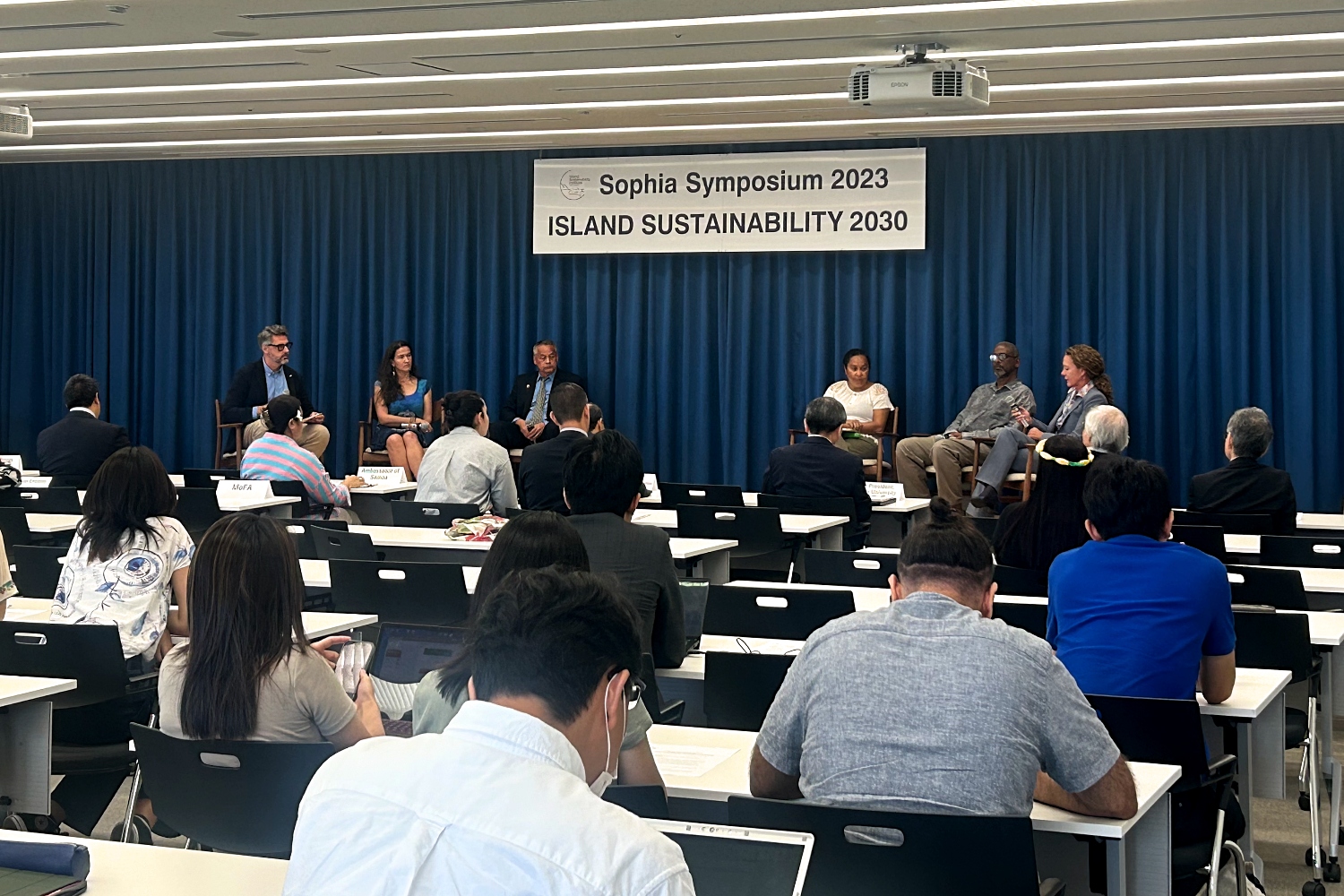Micronesia Future Leaders Invitation Program

The first Island Sustainability Symposium took place in July 2017; however, this symposium was the first to take place after the establishment of the Sophia University Island Sustainability Institute in July 2022. The event was held in a large conference room on the Sophia campus, where APIC President Toshinori Shigeie and Sophia University Vice President for Academic Research Affairs Takashi Okada each gave an opening speech. The roundtable panelists included ISI Director Anne McDonald; Willy Koskta, Executive Director of Micronesia Conservation Trust, FSM; Dr. Patrick McConney, University of the West Indies; Dr. Maria Angela Echeverry Galvis of Javeriana University, Colombia; and Ms. Bertha Simmons, Environmental Consultant, Barbados. After a lively discussion between the panelists, a lively Q&A session with the audience followed. In attendance were about 100 people, including ambassadors and employees from embassies of the Caribbean and Pacific islands, as well as university students.
APIC President Shigeie’s opening remarks included references to APIC’s projects, in particular the 2014 Memorandum of Understanding between APIC and Sophia University, and the first Island Sustainability Symposium which Willy Koskta attended, as well as APIC’s Environmental Seminars in the Pacific and Caribbean. He also praised the contributions of Professor McDonald, and mentioned that Dr. McConney had previously taken part in APIC’s Barbados Future Leaders Invitation Program. He ended his remarks by expressing his hopes for a productive debate in the “era of global boiling”, to quote the UN Secretary-General Guterres.
During the roundtable discussions, experts and researchers debated about the complex challenges relating to sustainability in Small Island Developing States (SIDS) of the Pacific and Caribbean, which are facing climate change and a number of other environmental challenges. Specifically, the topics of fishery management, protected marine areas, community approaches, adaptation to climate change, and the importance of developing human resources, among others, were brought up for discussion where panelists were able to communicate issues being faced in Colombia, Barbados, Micronesia, and elsewhere.
The regions’ vulnerability due to the COVID-19 pandemic and the increase of sargassum was pointed out during discussion, but the need to use marine resources for economic growth while protecting ecosystems according to the “blue economy” concept was also emphasized. The importance of interdisciplinary research and international cooperation needed to approach sustainability challenges was stressed, and the panelists displayed a need to cooperate in order for the islands to build a sustainable future. The importance of traditional knowledge, promoting dialogue, sharing best practices, developing research, developing human resources and capacity building were also highlighted. Dr. Sali Augustine, Sophia University Graduate School Director, thanked all participants and audience members for making the symposium a success during his closing remarks.
WHAT'S NEW
- 2024.12.4 UPDATE
PROJECTS
"Barbados A Walk Through History Part 14"
- 2024.9.17 UPDATE
PROJECTS
"Barbados A Walk Through History Part 13"
- 2024.7.30 UPDATE
EVENTS
"408th Lecture Meeting Regarding Global Issues"
- 2024.7.23 UPDATE
PROJECTS
"Barbados A Walk Through History Part 12"
- 2024.7.9 UPDATE
ABOUT
"GREETINGS FROM THE PRESIDENT JULY 2024"
- 2024.7.4 UPDATE
EVENTS
"APIC Supports 2024 Japanese Speech Contest in Jamaica"
- 2024.6.27 UPDATE
EVENTS
"407th Lecture Meeting Regarding Global Issues"
- 2024.5.21 UPDATE
EVENTS
"406th Lecture Meeting Regarding Global Issues"
- 2024.5.14 UPDATE
EVENTS
"405th Lecture Meeting Regarding Global Issues"
- 2024.4.2 UPDATE
PROJECTS
"Water Tanks Donated to Island of Wonei, Chuuk, FSM"




